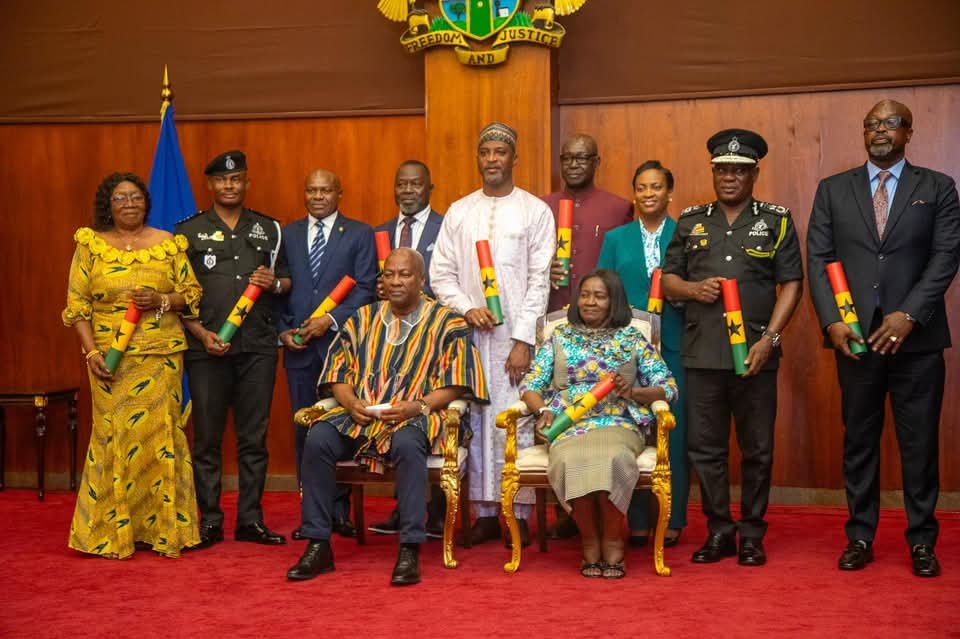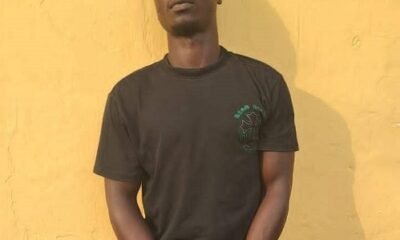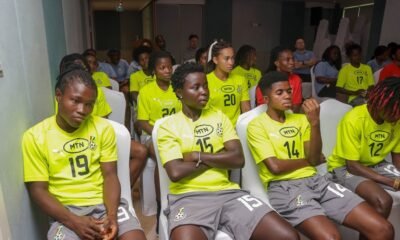News
President Mahama swears in Chairperson and Members of governing council of Ghana Police Service

The President of the Republic of Ghana John Dramani Mahama, has sworn in the Chairperson and members of the Police Council yesterday, June 10, 2025 at a brief ceremony held at the Jubilee House in Accra.
In his speech, the President urged the Council to promote reforms in the service, prioritize the welfare of personnel and deal with issues of undue delays in promotion and other personnelgrievances.
He further urged the Council to work to enhance professionalism, align the Service with the resetting agenda of the government and build trust within the Service as well as between the Service and citizens.
He therefore called for a people centered policing approach built on community partnerships, dialogue, accessibility and empathy.
The President also commended the Service for successes chalked in major criminal cases such as the rescue of the two women kidnapped in Nigeria, strides made in the fight against robbery including the arrest of suspects in the murder of the momo merchants, as well as the arrest of suspects in the murder of five people at Asiyaw.
He promised full government support for the Council and the Police Service including logistical support to improve service delivery and operational efficiency of the Service.
Speaking on behalf of the Council, the Vice President of Ghana and the Chairperson of the Council Prof. Naana Jane Opoku-Agyemang thanked the President for the trust reposed in them and noted that they will be bound by a sense of duty to ensure a Police Service that is empowered, well trained and accountable.
She urged Council members to be united in purpose and work towards a safer, fairer and a more just Ghana.
Below is a composition of the Police Council:
- H.E. Naana Jane Opoku-Agyemang – Chairperson (Vice President of the Republic)
- Hon. Mutaka Mohammed Mubarak – Member (Minister for the Interior and Member of Parliament)
- Mr. Christian Tetteh Yohuno – Member (Inspector-General of Police)
- Dr. Dominic Akuritinga Ayine – Member (Minister for Justice and Member of Parliament, representing the Attorney General’s Department)
- Mr. Daniel Owusu Nyampong, Esq. – Member (Representative of the Ghana Bar Association)
- COP/Nathan Kofi Boakye (Rtd.) – Member (Representative of the Retired Senior Police Officers Association)
- DCOP/Lydia Yaako Donkor – Member (Representative of Senior Officers of the Ghana Police Service)
- Chief Inspector Angel Lolo, Esq. – Member (Representative of Junior Officers of the Ghana Police Service)
- COP/Ms. Rose Bio Atinga (Rtd.) – Member (Appointee of the President)
- Mr. Benson Tonga Baba -Member (Appointee of the President)
News
Man sentenced to 25 years for robbery at Manso Akwasiso

A 30-year-old man has been sentenced to 25 years imprisonment with hard labour by the Bekwai Circuit Court for his role in a 2022 robbery at a mining site at Manso Akwasiso in the Ashanti South Region.
The convict, Dominic Ofori, also known as Fanta, was arrested on 16th February 2026 after years on the run. He pleaded guilty before the Bekwai Circuit Court to robbery contrary to Section 149 of the Criminal Offences Act, 1960 Act 29, and was accordingly sentenced to 25 years imprisonment with hard labour.
On March 20, 2022, the Manso Adubia District Police received intelligence that a group of armed men from Manso Abodom were planning to attack a mining site at Manso Akwasiso to rob the owner of gold concentrate. Acting on the information, police mounted a coordinated operation and laid an ambush at the site.
At about 5:30 pm the same day, four-armed men arrived at the site, fired indiscriminately, and robbed the miners of their gold concentrate. The police team on surveillance intervened, resulting in an exchange of gunfire.
Three of the suspects, Abu Abubakar, Musah Latif, and Gideon Takyi, sustained gunshot wounds and were pronounced dead on arrival at St Martins Catholic Hospital at Agroyesum. Dominic Ofori escaped at the time but was later arrested and put before the court.
The Ashanti South Regional Police Command has assured the public of its continued commitment to combating violent crimes and bringing offenders to justice.
News
Ashanti police arrest man for publishing false news on TikTok

The Ashanti Regional Police Command has arrested 45-year-old Isaac Boafo, also known as “Duabo King,” for allegedly publishing false news intended to cause fear and panic.
Police said the arrest follows a viral TikTok video in which Boafo claimed that four officers at the Central Police Station in Kumasi engaged in inappropriate conduct with commercial sex workers during night patrols in Asafo.
Officers from the Police Intelligence Directorate (Ashanti Region) apprehended Boafo after receiving intelligence about the video.
During questioning, he admitted to creating the video to attract views and engagement online, and acknowledged that he could not prove the allegations.
Boafo also admitted making comments about the President of the Republic for content purposes and could not defend those statements.
He has been formally charged and is in detention as investigations continue.
The Ashanti Regional Police have warned the public against publishing or sharing false information on social media, noting that such acts can cause fear, panic, and damage reputations.
They said anyone found engaging in similar conduct will face legal action.
By: Jacob Aggrey














